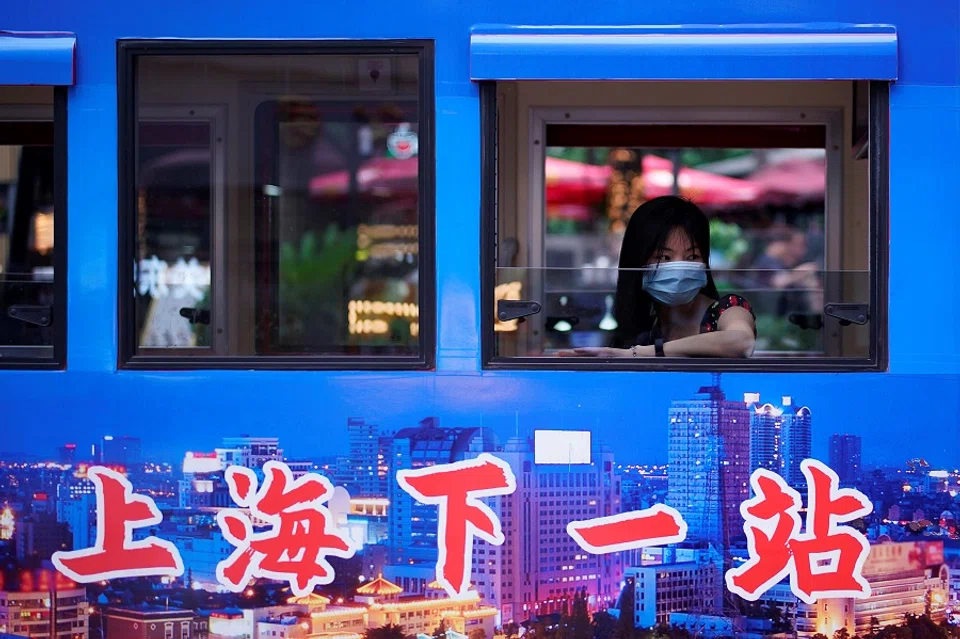After Covid-19: People can't wait to visit China again
Lianhe Zaobao reporter Chen Jing was shocked to see a long queue of people when she went to apply for a visa at the Chinese Visa Application Service Center in Singapore. Assigned to be the paper's correspondent in Shanghai just before the coronavirus threw a spanner in the works, Chen has done her fair share of virtual reporting from her home in Singapore. She looks forward to the day that she can be on the ground in Shanghai, now that Singapore and China have installed the "fast lane" for essential travel.

Even before stepping into the Chinese Visa Application Service Center (CVASC) in Singapore, I was shocked by what I saw as the lift door opened.
Though the Center's opening hours had just begun, there was a long queue, made even longer by the safe distancing requirement to stand one metre apart. Those who got in line behind me had no choice but to wait downstairs.
"We should just fly to wherever plane tickets are available. Otherwise, we don't know how much longer we would have to wait again." - Singapore businessman
I was last here three months ago, applying for a visa so that I could take up my position as Lianhe Zaobao's correspondent based in Shanghai. Then, the Covid-19 pandemic was quickly spreading across the globe. To prevent imported cases from entering its shores, China imposed a temporary travel ban on foreigners. My visa application was suddenly paused and I could only retrieve my passport before the CVASC closed its doors. That day, there were only two to three people in the huge service hall.
One disgruntled applicant asked, "When are you reopening?" Smiling helplessly, the receptionist replied, "We do not know as well. We'll have to wait for further instructions."

Earlier this month, after Singapore and China created a "fast lane" to facilitate essential business and official travel between both countries, travel between the two countries has gradually resumed, and my Chinese visa has also been reapproved. This time, the CVASC was filled with people all eager to visit China. Face masks could conceal their faces but not the excitement in their voices.
A middle-aged man in front of me needed to rush back to China as his father was critically ill. He was checking and confirming all the forms he had to submit. Another company employee beside me was on the phone with his manager, asking if he should pay more for an express service to get his visa approved as soon as possible.
Two local businessmen behind me were discussing which city they should arrive in to gain more accessibility to Wuhan, which was not yet included in the Singapore-China fast lane. One of them concluded, "We should just fly to wherever plane tickets are available. Otherwise, we don't know how much longer we would have to wait again."
Covid-19 screenings have to be completed before departure and upon arrival. To avoid a 14-day quarantine from the outset, dedicated chauffeurs and cars have to be arranged to ensure a closed-loop journey.
He is right. Even if all applicants at the CVASC get their visas approved, they would need to wait for international plane tickets to become available before they can leave. Not many people are able to come and go as they please now. Besides, after gaining entry into China, the traveller will undergo a 14-day controlled itinerary at the supervision of the host agency before further onward journeys can be made (provided they had cleared the PCR test and serology test upon arrival where they would have isolated themselves for one or two days in situ).
In truth, even if one is travelling under the "fast" lane, the entire process of gaining entry into China will be much slower and more tedious than pre-pandemic days. Applicants have to first apply to the hosting agencies of the country they are heading to, and gain approval from the person-in-charge over there before they can apply for a visa. Covid-19 screenings have to be completed before departure and upon arrival. To avoid a 14-day quarantine from the outset, dedicated chauffeurs and cars have to be arranged to ensure a closed-loop journey.

Nobody likes to wait. Yet, in the face of a public health crisis, time is the smallest price to pay. Local business representatives who were among the earliest to gain entry to China via the fast lane told me that they had originally planned to travel to Jiangsu at the beginning of the year to discuss their investment plans. However, little did they know that their plans would be delayed for half a year. They were "already very lucky" to be able to finally enter China via the fast lane.
To meet the needs of an unending line of applicants, the CVASC will extend its office hours three days a week instead of two. This month, Scoot has also resumed flights to Guangzhou and Hong Kong. Next month, they will resume flights to Taipei.
While these services have not returned to their normal levels before the pandemic broke out, they have made good progress towards normalisation.
As my latest visa application coincided with a new wave of Covid-19 cases in Beijing, some of my friends were worried that it would fall through if the outbreak spread. Thankfully, the authorities took swift action and were able to reduce single-day confirmed cases to single-digit increments within ten days. Disease control experts predict that Beijing's fresh wave of outbreak would end soonest by this week. Having gained prior experience in pandemic containment over the past six months, Beijing was able to quickly contain the outbreak, giving China the confidence that the country would not be locked down again.

In recent months, it was not only the government that had mastered more effective preventive measures - the people have also gradually adapted to a new way of work and life. Various industries have found a way to manage the business whilst keeping preventive measures in place, and are ready to welcome a new normal in the post-pandemic era.
This international metropolis is performing well amid the pandemic and exploring new ways to rejuvenate and revitalise itself.
Over the past three months of waiting to assume my position in Shanghai, I have also experienced many firsts. For example, I worked from home for an extended period of time for the first time; I covered the lianghui (两会, annual meetings of the National People's Congress and the Chinese People's Political Consultative Conference) remotely for the first time; and now, I am also the first China correspondent at the paper to begin writing a column before I actually assume my position there. These unprecedented changes could possibly be the new norms that people have to adapt to in the future: getting used to longer waiting times, being accepting of more uncertainties, and learning to find a new balance amid a changing world.
During this period, following Shanghai's May 5th Shopping Festival, a nightlife festival was launched in June. Shopping malls, restaurants, bars, museums, and even book stores have all participated in the festival by opening night markets or extending their opening hours to attract consumers and create a "Shanghai Nights" (夜上海) nightlife circle. The Shanghai Grand Theater has also opened its doors last week, entertaining its audience once again. This international metropolis is performing well amid the pandemic and exploring new ways to rejuvenate and revitalise itself. Although I have missed both the shopping and nightlife festivals, I still look forward to the day that I can be in Shanghai and have a glimpse of the city's post-pandemic landscape for myself.
Shanghai, please wait for me a little more. We will be meeting very soon.





![[Photos] Fact versus fiction: The portrayal of WWII anti-Japanese martyrs in Taiwan](https://cassette.sphdigital.com.sg/image/thinkchina/3494f8bd481870f7c65b881fd21a3fd733f573f23232376e39c532a2c7593cbc)